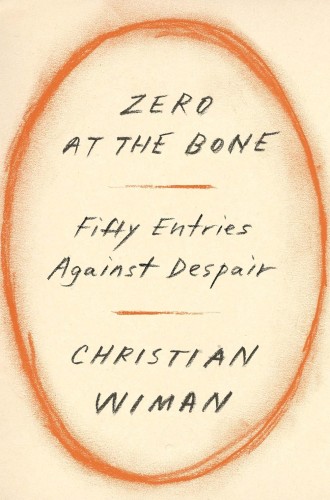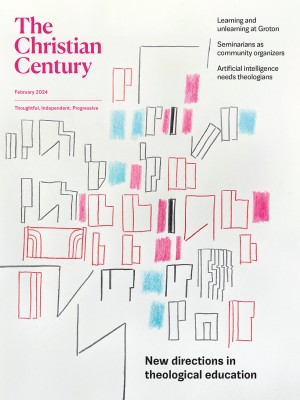Christian Wiman’s feel-bad memoir
Zero at the Bone is extraordinary. Just don’t expect it to be delightful.
I’m no physicist, but I understand this much about how things work: when a person is leaning against a wall, the wall is paramount. If it crumbles, she will collapse along with it. Well, when a poet writes Zero at the Bone: Fifty Entries against Despair, the despair is paramount. The despair is the point—the fulcrum upon which everything elegantly balances.
Christian Wiman’s new book does not, as I wrongfully suspected, have much in common with Ross Gay’s The Book of Delights. Although both men are poets who embrace short-form prose, it turns out that writing against despair is a far cry from writing for delight. Likewise, Wiman’s new book does not, as I also wrongfully suspected, have much in common with his previous memoir, My Bright Abyss. Zero at the Bone may have its own share of abysses, but few of them are bright.
Read our latest issue or browse back issues.
Still, Wiman opposes the encroaching shadow with all of his strength and with all of his words. What else can one really expect from a writer who, in the first entry, admits that he finds faith to be “an eruption of joy that evaporates the instant [he] recognize[s] it as such, an agony of absence that assaults [him] like a psychic wound”? Or who later admits, “I don’t know how to talk about suffering without talking about God,” even though he also admits that he is “tired of talking about God.”
Wiman is equally adept as a poet, critic, and memoirist, and he drifts from genre to genre between and within entries. Some of the poems are his own; some are lines and stanzas borrowed from others. There is also plenty of theology and philosophy—sometimes Wiman’s, sometimes not. He has a knack for dropping quotes that crackle in their new context, even without a word of explanation. In the fourth entry—one of a handful that are entirely composed of quotes from other writers—Karl Barth intones, “One cannot speak of God simply by speaking of man in a loud voice.” The 11th entry begins with an epigram from Adélia Prado that is emblematic of the whole project: “I am beginning to despair / and can see only two choices: / either go crazy or turn holy.”
Some of the stories Wiman recounts from his own life are not so much crazy-making as downright traumatic; one can’t help but give thanks that the man found God. (Or did God find him?) Regardless, some of the most engaging entries are narratives about his bleakest experiences in the bleakest part of Texas with his family of origin. His father and sister are particularly vivid characters in his short stories about despair, though Wiman notes that this is a problematic way to conceive of them:
What I want to say now—it will sound crazy—is that these people are not crazy. (These people—as if I weren’t one of them.) They are not Faulknerian characters distilled to their most dire moments and neuroses. Or perhaps they are just not “characters,” and that’s the problem. I want it to be fiction, just as I often want God to be pure imagination, pure mystical abstraction. . . . My family’s story often feels like fiction to me, especially when I try—as I have been trying here—to tell it to other people. But then something happens, and I experience again the ruthless, relentless nature of its truth.
There is tragedy in the family stories Wiman tells, and a streak of tragic comedy. But there is also a miracle—a wholly unexpected miracle, the kind that threatens to ruin despair.
Wiman’s cancer loomed large in My Bright Abyss, the stunning misery of it still sharp in his mind. It’s not absent in Zero at the Bone, but it’s more matter-of-fact. It is the reason why Wiman must sit in the so-called Cancer Chair once a month to receive the infusions that keep his incurable cancer at relative bay. The 49th entry finds him at the oncology center, reading the book of Job and thinking about Nietzsche. He acknowledges how out of place he is in this place where the “jocular sufferer” is preferred to—well, to the sort of cancer patient who passes the time by pondering Nietzsche. As a pretty nurse adjusts his chemo lines, Wiman perseverates on the apparent “half-atheism” of his seminary students and the paradoxical nature of existence. “I believe the right response to reality is to bow down,” he writes, “and I believe the right response to reality is to scream.”
Reading Zero at the Bone, I was reminded of when I watched The Banshees of Inisherin on an airplane because I erroneously believed that it would be a feel-good movie. It was startling to encounter the film on its own, decidedly feel-bad terms. This is not to say Zero at the Bone is not an extraordinary book. It is extraordinary—and complicated, and demanding. But it is not delightful, not even in its most transcendent passages. It’s probably best to go into it with a clear-eyed view of what to expect. Expect despair. But also expect a voice crying out in the midst of that despair—screaming one moment, singing the next.







